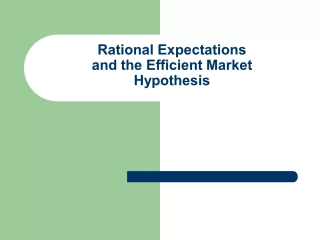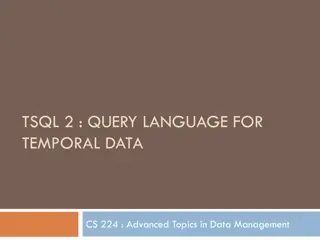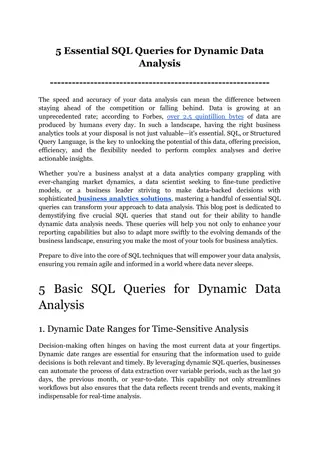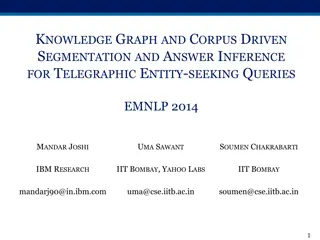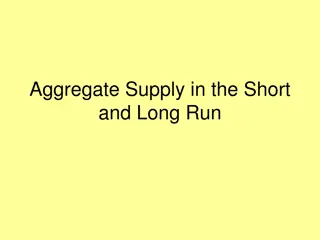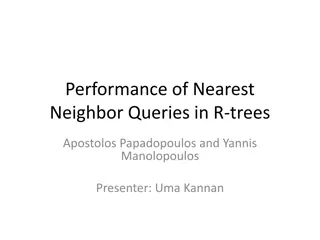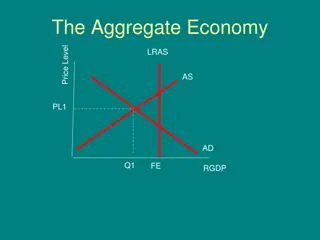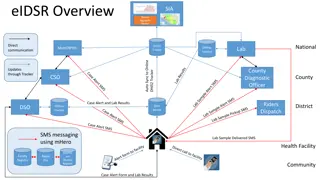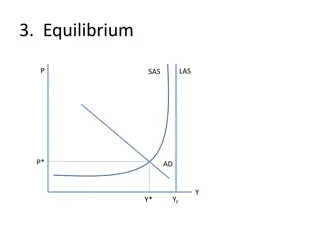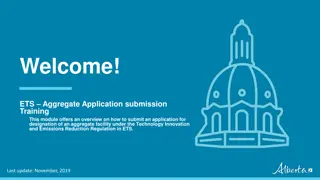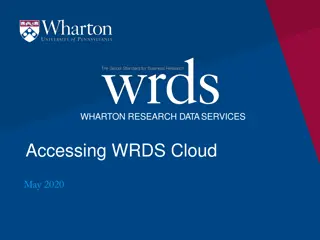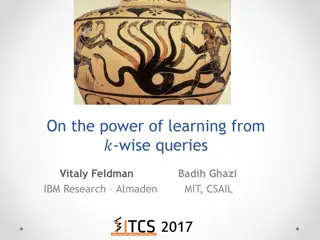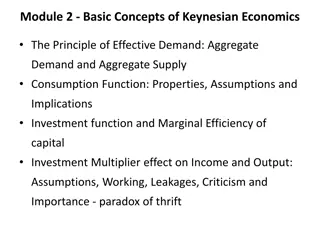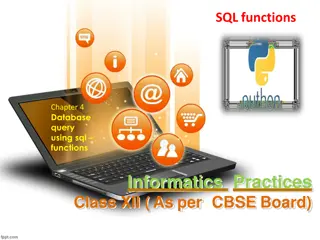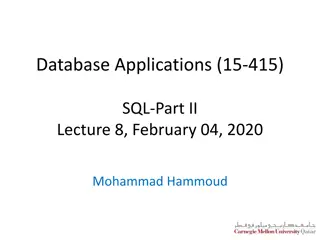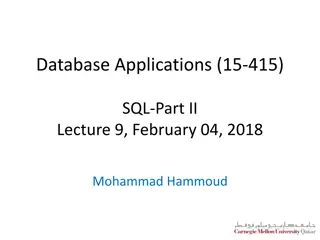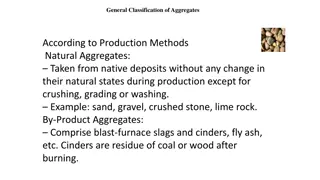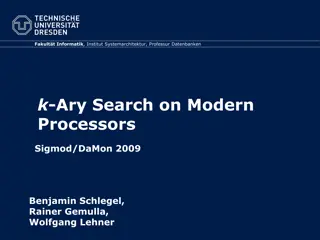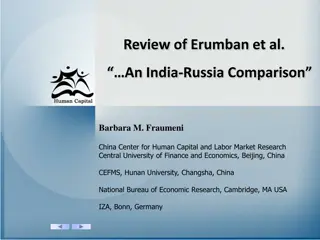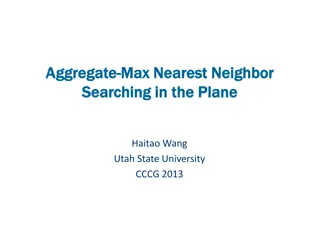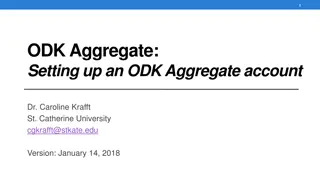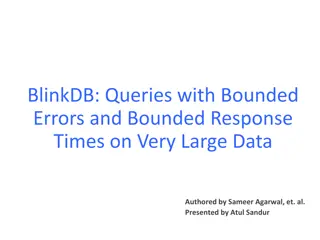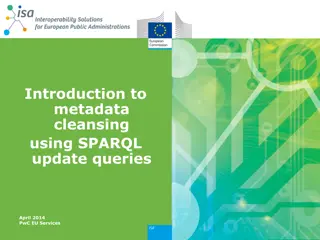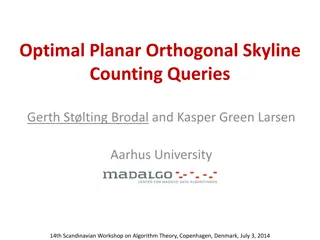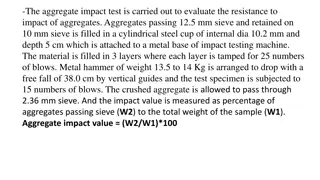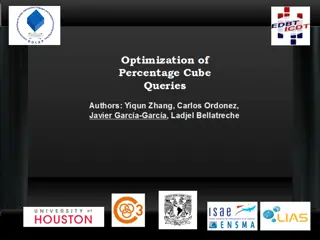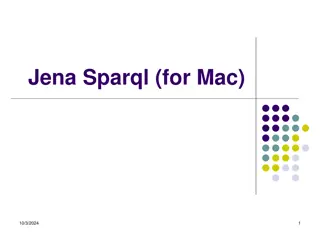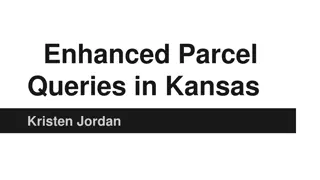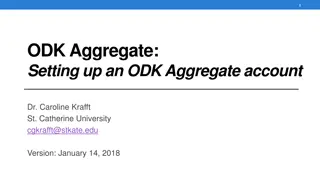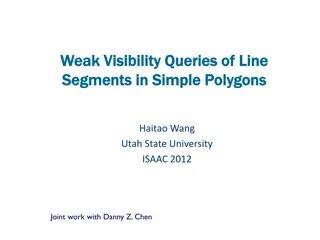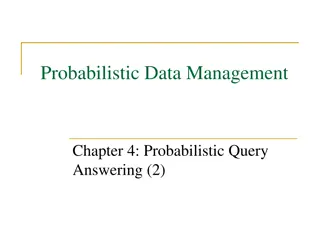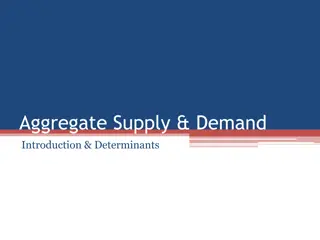Rational Expectations and the Efficient Market Hypothesis
The importance of expectations in various sectors and markets of the economy, including asset demand, risk and term structure of interest rates, asymmetric information and financial structure, financial innovation, bank management, money supply process, Federal Reserve, foreign exchange market, dema
6 views • 51 slides
Understanding Aggregate Planning in Supply Chain Management
Aggregate planning is a crucial aspect in supply chain management that involves determining production quantities and timing over a medium-term horizon. It helps in aligning production values, workforce levels, inventory levels, overtime work, subcontracting rates, and other controllable variables t
8 views • 36 slides
ARGOS Inventory by Fund Queries Presentation Slides
The presentation slides showcase the ARGOS Inventory by Fund Queries project, featuring detailed information and visuals to help understand the queries and data analysis process. The slides provide insights into inventory management methods based on different funds, highlighting key aspects of the A
1 views • 14 slides
Understanding Temporal Data Management in TSQL Queries
Explore the realm of temporal data in TSQL queries, delving into the concepts of valid time and transaction time, different types of relations like snapshot and bi-temporal, and the significance of time dimensions in database management. Learn how temporal databases support time-related queries for
6 views • 41 slides
5 Essential SQL Queries for Dynamic Data Analysis
Explore the transformative power of SQL with our latest guide, which highlights five critical SQL queries essential for dynamic data analysis. This post covers how these queries can be utilized by business analytics tools to enable data analysts, scientists, and BI professionals to extract actionabl
6 views • 8 slides
Green Outlook Bank Student Coaching
Delve into the workings of Federal Reserve stabilization policies, analyzing economic data, applying statistical regression techniques, and forecasting inflation and output growth. Explore concepts of inflation calculation, aggregate demand, aggregate supply, and the interplay between money supply a
0 views • 11 slides
Knowledge Graph and Corpus Driven Segmentation for Entity-Seeking Queries
This study discusses the challenges in processing entity-seeking queries, the importance of corpus in complementing knowledge graphs, and the methodology of segmentation for accurate answer inference. The research aims to bridge the gap between structured knowledge graphs and unstructured queries li
0 views • 24 slides
Understanding Aggregate Supply in the Short and Long Run
Aggregate Supply in the short and long run is crucial in understanding the relationship between the economy's price level and the total quantity of goods and services produced. In the short run, sticky wages and production costs play key roles in determining supply levels, while in the long run, cha
0 views • 16 slides
Performance of Nearest Neighbor Queries in R-trees
Spatial data management research focuses on designing robust spatial data structures, inventing new models, constructing query languages, and optimizing query processing. This study explores the estimation of query performance and selectivity, specifically in R-trees, for efficient access planning.
1 views • 32 slides
Understanding Aggregate Demand in Macroeconomics
Economic well-being in the aggregate economy is determined by Real GDP, influenced by current levels of Aggregate Demand (AD) and Aggregate Supply (AS). Aggregate Demand slopes downward due to various effects like Wealth Effect and Interest Rate Effect. It is crucial in determining total spending in
4 views • 13 slides
Concrete Mix Design: Optimal Proportions & Aggregate Gradation
Concrete mix design is crucial for achieving the desired properties and performance of concrete. The Maximum Aggregate Density Mix Design method helps determine the best proportions for Portland Cement Concrete. Utilizing combined aggregate gradation near the maximum density line can reduce shrinkag
0 views • 34 slides
eIDSR Weekly Aggregate Report and Communication Overview
This report provides an overview of the eIDSR system, focusing on weekly aggregate reports, direct communication channels, offline and online tracker synchronization, lab sample tracking, partner collaborations, and key acronyms in the health surveillance field.
0 views • 5 slides
Understanding Economic Policies: Monetary and Fiscal Approaches
Explore the dynamics of economic equilibrium, aggregate demand, and supply while delving into the effectiveness of monetary and fiscal policies. Learn about strategies to tackle inflation and unemployment through contractionary and expansionary measures, and how crowding out can impact the economy.
0 views • 9 slides
ETS Aggregate Facility Application Submission Training Overview
This module provides guidance on submitting applications for designation of an aggregate facility under the Technology Innovation and Emissions Reduction Regulation in ETS. Learn about background, ETS login, browser compatibility, support, TIERR data navigation, and more. Explore the new emission re
0 views • 13 slides
Understanding the Differences Between Web Queries and WRDS-Cloud Queries
Explore the distinctions between web queries and WRDS-Cloud queries, such as the tools used, query limitations, and knowledge requirements. Learn how to access support for WRDS Cloud and enhance your data research skills.
0 views • 5 slides
Exploring the Power of Wise Queries in Statistical Learning
Dive into the world of statistical learning with a focus on the impact of wise queries. Discover how statistical problems are approached, the significance of statistical queries, and the comparisons between wise and unary queries. Explore the implications for PAC learning and uncover key insights in
0 views • 8 slides
Understanding Keynesian Economics: Effective Demand and Aggregate Supply
Keynesian economics emphasizes the importance of effective demand in determining income, output, and employment levels. Effective demand, as outlined by Keynes, is the equilibrium level of demand that is met by aggregate supply to maintain stable employment and output levels. It is influenced by fac
0 views • 37 slides
Understanding SQL Functions for Database Queries
SQL functions are essential elements in performing actions and obtaining results in a database query. They come in two main types: scalar functions and aggregate functions. Scalar functions operate on single values, while aggregate functions operate on sets of data. Examples of SQL functions include
0 views • 14 slides
Exploring SQL Queries and Joins in Database Applications Lecture
Discover a comprehensive overview of SQL queries, including nested and deeply nested queries, in the context of database applications. Learn about joining tables, finding sailors who reserved specific boats, handling NULL values, and more in this informative lecture featuring examples and explanatio
0 views • 53 slides
SQL Part II Lecture Summary: Nested Queries, Joins, and Updates for Database Applications
In this SQL lecture, Mohammad Hammoud covers nested queries, insertion, deletion, updates, handling NULL values, join variants, and advanced query techniques. Examples include finding sailors who have reserved specific boats, using nested queries to filter data, and deep nested queries for complex d
0 views • 53 slides
Comprehensive Classification of Aggregates and Their Characteristics
Classification of aggregates based on production methods (natural, by-product, processed, colored), petrological characteristics (igneous, sedimentary), and particle size (fine aggregate, coarse aggregate). Examples and images are included for better understanding.
0 views • 5 slides
k-Ary Search on Modern Processors
The presentation discusses the importance of searching operations in computer science, focusing on different types of searches such as point queries, nearest-neighbor key queries, and range queries. It explores search algorithms including linear search, hash-based search, tree-based search, and sort
0 views • 18 slides
Analysis of India-Russia Economic Growth: A Comparative Study
This study compares the economic growth of India and Russia through an analysis of components such as gross value added, number of employees, capital services, and capital shares. It explores the concept of aggregate MFP and evaluates the use of an aggregate production function. The paper provides i
0 views • 11 slides
Searching for Nearest Neighbors and Aggregate Distances in Plane Algorithms
This overview discusses different algorithms related to nearest neighbor searching and aggregate distances in the plane. It covers concepts like aggregate-max, group nearest neighbor searching, applications in meeting location optimization, and previous heuristic algorithm work. Results include prep
0 views • 25 slides
Setting Up an ODK Aggregate Account: Step-by-Step Guide
This guide provides detailed steps on setting up an ODK Aggregate account, including options for deployment, installation instructions, user roles, and permissions. Learn how to manage collected data, deploy to Google's App Engine or a local server, and utilize different user capabilities within ODK
0 views • 11 slides
Overview of BlinkDB: Query Optimization for Very Large Data
BlinkDB is a framework built on Apache Hive, designed to support interactive SQL-like aggregate queries over massive datasets. It creates and maintains samples from data for fast, approximate query answers, supporting various aggregate functions with error bounds. The architecture includes modules f
0 views • 26 slides
Aggregate Material Tax Presentation at MACATFO Spring Meeting
Explore the comprehensive presentation on Aggregate Material Tax at the MACATFO South Region Spring Meeting held at Jackpot Junction, Morton on March 31, 2022. The agenda covers the definition of aggregate tax, identification of production counties, historical changes in statutes, compliance, and mo
0 views • 36 slides
Metadata Cleansing Using SPARQL Update Queries
Learn how to transform and cleanse RDF metadata using SPARQL Update queries to conform to the ADMS-AP for Joinup. This tutorial provides essential knowledge on converting metadata for interoperability solutions and the main queries involved. Discover how to ensure your metadata is compliant and read
0 views • 37 slides
Advanced Techniques for Orthogonal Skyline Counting Queries
Advanced techniques for orthogonal skyline counting queries discuss optimal planar solutions, dividing and conquering for topmost point identification, efficient vertical slab counting, succinct data structures for prefix sums and range maxima, upper bounds on degree and multi-slab queries, as well
0 views • 11 slides
Aggregate Impact Test Procedure and Apparatus Overview
The aggregate impact test is conducted to assess the resistance to impact of aggregates. This involves filling a steel cup with aggregates, tamping them, and subjecting them to impacts from a standard weight hammer. The resulting crushed aggregate is sieved to determine the impact value. The detaile
0 views • 4 slides
Efficient Network Traffic Queries Handling Strategies
Solve network traffic queries efficiently by ensuring constant memory updates and minimal memory access. Implement strategies such as managing multiple data structures for various query types and coordinating queries to optimize packet processing. Explore the coupon collector problem to enhance quer
0 views • 26 slides
Optimizing Queries and Constructing Percentage Cube in Business Intelligence
Presented at ENSMA, this paper introduces optimized strategies for constructing a percentage cube to enhance processing of complex queries in modern business intelligence. It discusses challenges, comparison between percentage queries and percentage cube, and showcases a data cube analysis of car sa
0 views • 21 slides
Unified Framework for Efficient Ranking-Related Queries Processing
The research paper discusses a unified framework focusing on efficiently processing ranking-related queries. It covers dual mapping and ranking, k-lower envelope usage in ranking, top-k queries solutions, and applications like identifying user preferences. The study showcases algorithms, experimenta
0 views • 22 slides
Understanding Jena SPARQL for Mac and RDF Queries
Jena SPARQL for Mac is a powerful tool for querying RDF graphs using SPARQL. Learn about RDF graphs, models, triples, and how SPARQL queries work. Explore ARQ, a query engine that supports the SPARQL RDF Query language and features multiple query languages. Discover how to install ARQ and execute SP
0 views • 25 slides
Enhanced Parcel Queries in Kansas by Kristen Jordan
Project aims to provide expanded tools and services for statewide parcel queries in Kansas. Background includes the Kansas Data Access and Support Center's existing project and the implementation of a REST web service. Specific goals involve accessing services through desktop and web applications, p
0 views • 20 slides
Guide to Setting Up ODK Aggregate Account
Learn how to set up an ODK Aggregate account, manage data, view different user roles, permissions, and users while using ODK Aggregate. Explore installation, options, and examples with step-by-step instructions and detailed images. Gain insights into deploying locally or on Google App Engine. Get st
0 views • 11 slides
Weak Visibility Queries of Line Segments in Simple Polygons - Overview
This information discusses weak visibility queries of line segments in simple polygons, focusing on topics such as visibility of line segments, visibility polygons, visibility graphs, and related previous work on preprocessing and data structures for visibility queries in simple polygons.
0 views • 26 slides
Investigating Anomalous DNS Queries: A Case Study from DNS-OARC 25, Dallas
The exploration uncovers a surge in AAAA queries, leading to a 20% spike in billing. Through meticulous analysis, patterns emerged showing excessive AAAA queries for specific nameservers lacking AAAA glue. Remedies included reaching out to providers and deploying temporary fixes. The resolution invo
0 views • 13 slides
Understanding Probabilistic Query Answering and Group Nearest Neighbor Queries
This chapter delves into probabilistic query types, focusing on probabilistic group nearest neighbor queries. Explore the definitions, processing techniques, and applications of such queries. Learn how probabilistic data management plays a crucial role in uncertain databases, spatial queries, and mo
0 views • 34 slides
Understanding Aggregate Supply and Demand in Economics
Explore the concept of aggregate supply and demand, including determinants and the relationship between price level and quantity demanded. Learn about the reasons for the downward slope of the aggregate demand curve and why the law of demand doesn't directly apply to the economy as a whole. Discover
0 views • 15 slides
